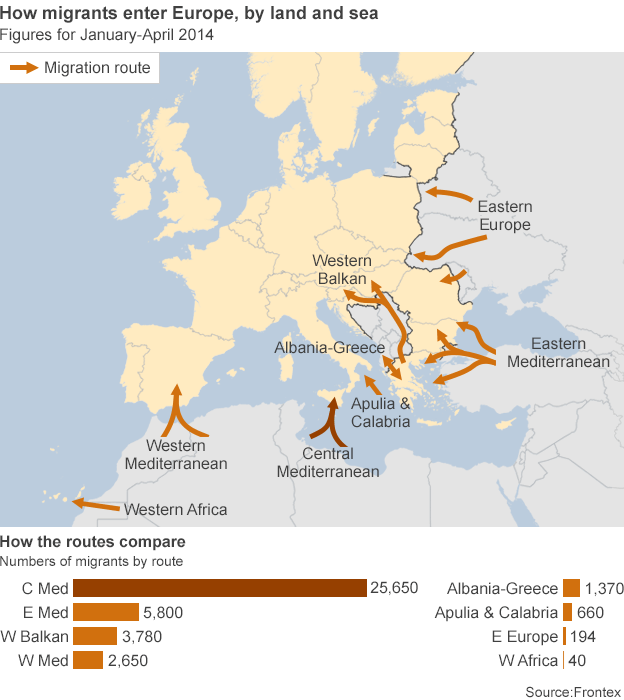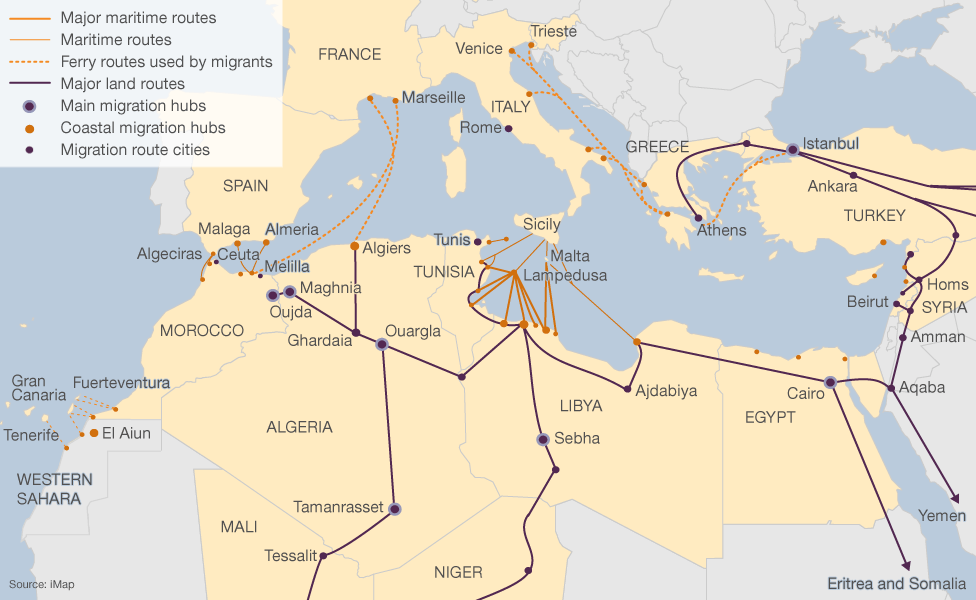The upturns and radical changes in the geopolitical vicinity of Southeastern Europe is raising substantial fears in policy-makers across the region that a major flow of illegal immigrants and refugees, chiefly from the battle fields of the Middle East is due to arrive by land or by sea in the coming months and years and will further deteriorate the situation and associated issues concerning illegal immigration.
Greece being for several years, as the main entrance and hub of such activities, bearing the burden mostly by incoming immigrants transiting from Turkey, is gradually upgrading its capabilities to combat this phenomenon to any extent possible. The incumbent Greek Presidency of the Council of the EU, which lasts until first of July 2014 and the successive Italian one, have illegal immigration into the EU as the main focus of their political agenda.
A series of measures aiming to safeguard borders and relating to the efforts by the Police, security and coast guard forces is being presented below, along with brief descriptions.
First of all a newly built open seas ship for the coast guard is in the process of being ordered that will have necessary equipment to track down incoming vessels of any type and in great distances, along with search and rescue capabilities for a large number of people. The cost of such is estimated at around 40 million Euros, and would be responsible for patrolling mainly in the Mediterranean Sea where the issue of Libyan sources illegal immigrants grows larger on a monthly basis. Furthermore, already six smaller fast patrol boats have been obtained by the coast guard capable of reaching 30 nautical knots per hour, costing 12 million Euros in total. The infrastructure would be coupled with the completion of the VTMS for Offshore Maritime Traffic Management, surveillance system for all Greek water ways and ports.
Furthermore, since the maritime environment in the Greek seas is noted for its dotted scenery of literally thousands of small islands, making surveillance an extremely hard work, the plans call for more alert stations, equipped with thermal cameras, radars and sensors, of a total budget exceeding 15 million Euros. Other notable and necessary systems that have already been procured are 15 portable thermal cameras, 3 motor vans with installed cameras capable of examining the insides of any vehicle or vessel, 100 new jeep autos, 4 small rubber speed boats, modern telecommunication tools and upgrades of older patrol ships, with all the aforementioned costing more than 10 million Euros. Concurrently the coast guard is upgrading its role in the country by being responsible for wider security operations that are indirectly related to the organized crime structures that assist illegal immigration. Recently 1.2 tons of pure heroin were confiscated in Athens by a joint DEA/ Special coast guard forces operation, leading to the arrests of Greeks, Turks and Albanians that were part of a wider criminal chain stretching from Afghanistan up to Belgium.
The Greek Police had in the past years administered and managed the establishment of a fence in the main land entrance to Greece from Turkey in the Evros river border. The 8 mile fence in a critical junction in the borders, along with a boosting of police guard presence, managed to reduce incoming flows, nevertheless, since 2013 the Syrian crisis has produced a new incoming wave and more than one million refugees of Syrian descent are said to be in Turkey and in transit. The plans for further upgrade of security are added by the procurement of 3 mobile command and control vans with thermal cameras, providing real-time image and sound to the central commands and embedded in the nationwide C4i system. Also four X-ray units will scan constantly suspicious vehicles that may carry groups of people within them in the region just inside the Greek territory when crossing from the East.
Nevertheless, since the whole project has to be thoroughly articulated so as to be effective the Police is up scaling its surveillance capabilities on air by the procurement of two more helicopters with necessary cameras, along with the introduction of dozens of UAV's capable of scanning the majority of the Greek borderline, along with particular high-danger junctions in motorways, ports and public facilities. The budgeting for all the above exceeds 25 million Euros.
To those, additional 300 rough terrain vehicles, 40 portable thermal cameras, new intelligence analysis software, software tracking systems, GIS systems and new telecommunication equipment has to be added, along with voice and dialect recognition software and DNA labs and data bases. The whole cost for those exceeds 20 million Euros.
The cost rises even further if one considers the significant surge in Police operations within the country for the deportation of illegal immigrants since mid-2012 with tens of thousands of exits, and great number of detentions with a cost that surpasses 150 million Euros. To that it has to be noted that the costs associated with extra policing, manpower used and secondary expenses cannot be numbered but all available sources point out that a great deal of everyday work for the local Police is related to illegal immigration issues.
Despite all the above the recent events in Iraq with the expansion of the most brutal form of Jihadism points out that new immigration flows will reach the EU and most probably coming to its Balkan flank and directly related with assorted security issues, such as the "returnees" jihadists and weapons contraband along with more drug deliveries. In those circumstances it is fundamental for the countries that will bear the consequences, and more specifically Greece, Bulgaria, FYROM and Serbia, to boost their bilateral cooperation in that sector and create a stronger nexus of collaboration in order to withstand an emerged pressure by irregular immigration that has direct demographic and political implications.
Furthermore Western Balkan countries, aspiring to join the EU such as Albania, Montenegro and Bosnia should also join the effort and at the same time look into the issue, which has started affecting them as well, being seen as "weak links" for the routes being used by the organized crime networks involved in illegal immigration.
Lastly Italy which has been receiving the bulk of Libyan exported immigrants is directly associated with the Southeastern European environment due to its proximity with both Greece and Albania from where it also receives Asians and Africans en route to other EU countries.
In a nutshell the following measures should and could be taken by all those countries mentioned:
-More investment in human and technical resources, systems, organization and methods
- Further collaboration and joint operations in between the neighboring countries affected
- Diplomatic unity in the face of the issue and vis-a-vis Turkey which stands as the main transit conduit of incoming immigration flows and in parallel directly implicated into destabilizing Middle Eastern countries
- Seek out for more EU-funded and backed structures relating to the issue
- Sweeping and long-range investigations to take out criminal syndicates involved in human smuggling, forged paper production and illegal immigration assistance
The stakes are high. A massive inflow of more immigrants into Europe will create destabilizing political effects in most countries along with the serious economic, social and health concerns. Moreover a chain reaction effect of illegal immigration, will lay the foundations of a continuation of a decades long procedure that will render stability in both the Balkans and the rest of Europe and exacerbate simmering ethnic tensions.
Multiculturalism as a notion is already dead and buried for years and in the face of the dramatic developments in the Middle East which open a new and violent chapter in human history, Europe should be focused on how to keep the peace in the region rather than passively waiting for the whole of Asia to reallocate Westwards and in due time. That will solve no problem and in fact it will duplicate the Middle Eastern conflicts in all major EU urban centers, a process that has already started.




